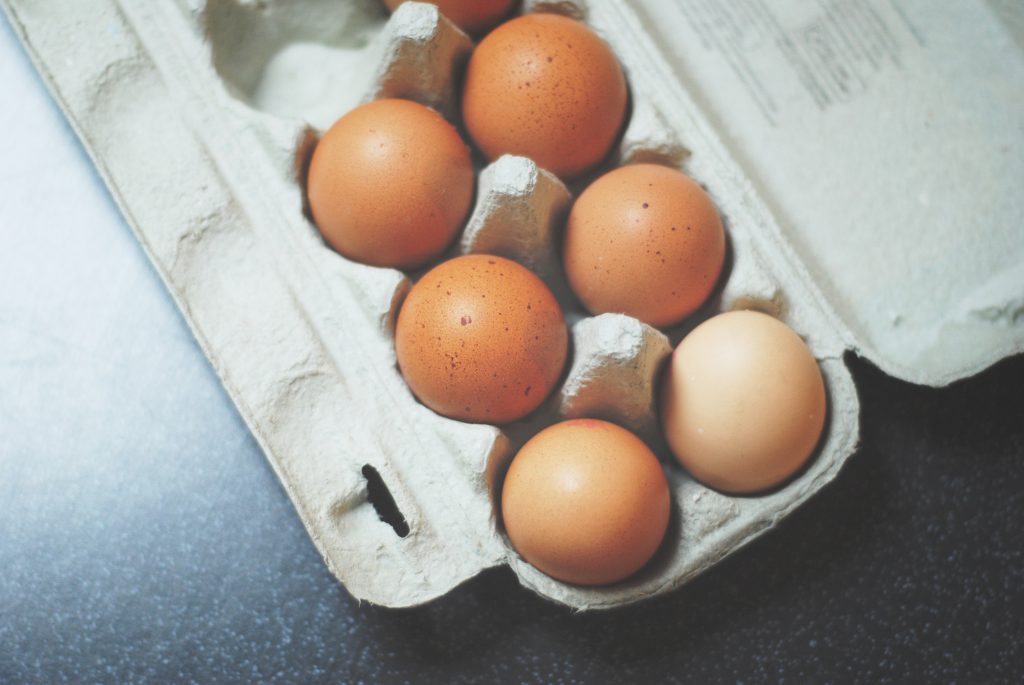At 100km Foods, we offer a variety of different types of farm-fresh eggs from Homstead Farm. From their classic eggs to free-run to organic to Mennonite free-roaming and more, each egg variety has a different story behind where it comes from.
We often get asked questions about the differences between each of our egg varieties so we've created a guide to our local farm-fresh egg offering from Homestead so that you can make the most informed decision when deciding what type of eggs in our offering best suit your needs and sourcing ethos. This blog post will also illustrate why we feel so confident sourcing our eggs from Homestead and what makes them different from other egg suppliers.

Farm fresh eggs from homestead farm
Homestead's history dates back to the 1960s when Pat Flack's parents, Tom and Margaret Flack, began raising chickens for meat. Eventually, they transitioned towards raising their hens for eggs. In 1978, they began sending their eggs to local grading stations so they could be sold in stores. By 1986, the opportunity arose to purchase and construct their own on-farm egg grading station, and they jumped at it.
Today, Homestead Farm (in addition to their own flocks) purchases eggs from around 40 other local farms and surrounding Amish and Mennonite communities to offer a larger variety of eggs including:
- Homestead Farm Classic Eggs
- Homestead Farm Free-Run Eggs
- Homestead Farm Certified Organic Eggs
- Homestead Farm Mennonite Free-Roaming Pasture Eggs
- Conestoga Eggs
- Homestead Farm Duck Eggs
- Homestead Farm Quail Eggs
You can click each link above to jump to the section about each type of egg, or read along to learn more about Homestead, their grading station and our entire egg offering from Homestead.
You can also view all SKUs of our Homestead eggs by logging into your account & viewing their producer profile.
Homestead Farm's Grading Station
Homestead Farm is a very small Registered Egg Grading Station that has been family-owned and operated since 1978. They use less automated machinery with a more involved approach than other larger grading stations. They have various employees at different stations along the line, all of them paying close attention to any imperfections.
As part of the grading process at Homstead, eggs move into a darkened candling "room" where they roll over a bright light to reveal any cracks, blood spots, meat spots, rot, poor quality yolk or other imperfections. By rolling the eggs as they pass over the candling light, the entire outer surface of the egg can be seen by the grader. This makes even the most invisible cracks visible. It also allows dirt, stains, or excessively rough shelled eggs to be seen by the grader and removed from the line if they don't meet the grade requirements for Canada Grade A eggs.
The eggs that pass inspection are then cleaned with sprayers and brushes before being weighed and sorted into medium, large and extra large and hand-packed into cardboard boxes. The eggs travel from nest box to your restaurant/business in just 4-7 days.
This kind of care and detail oriented attention to grading means Homestead grades just 50 cases an hour. This is compared to the big guys who grade up to 400 cases per hour. Although they might grade slower, they make up for it in the top notch quality of all their eggs. This is why Homestead Farm eggs aren’t just average eggs you can find in any grocery store - they truly are small-flock.
Homestead Classic Eggs
Homestead's traditional farmed eggs (brown and white) come from flocks housed in coops (not free-run) in the barn at Hometead Farm. These eggs are locally farmed and flock sizes are in the thousands.
We carry Homestead's classic eggs in extra large and large, and in both white and brown.
Homestead Free-Run Eggs
As consumers have shifted to demanding more ethical animal practices, like "free-run" when sourcing eggs, a lot of bigger, corporate controlled farms also wanted to cash in on the ethical impulse behind consumer purchases. Now, you can find "free-run" eggs in almost any grocery store.
But, it's important to note that not all eggs labelled "free-run" are equal. Homestead's free-run eggs come from just 55 different flocks with just hundreds of birds. For comparison, larger egg farmers have flocks easily numbering in the thousands.
Homestead's free-run birds have access to open barn space where they can run freely (hence free-run) as well as access to the outdoors, depending on the weather, although most are content staying inside their safe and sheltered barn.
Learn more about our small flock free-run eggs from Homestead in this blog post.
We carry Homestead's small flock free-run eggs in medium, large and extra large brown eggs.
Homestead Organic Free-Run Eggs (Pre-Order Required!)
In addition to the same qualities as Homestead's free-run eggs, Homestead's organic free-run eggs are Certified Organic from the day they are hatched! This means these chickens are not vaccinated with immune system boosters, as most other chickens are, are fed organic feed only, and are raised free-run meaning they too have access to open barn space.
We carry Homestead's organic free-run eggs in large brown eggs.
Mennonite Free-Roaming Pasture Eggs (Pre-Order Required!)
Homestead has developed close personal relationships with some nearby Amish and Mennonite farmers who they source some of their eggs from.
In many rural communities, looking after the chicken flocks and selling eggs is a job that often falls to women. In fact, for some of these women, it's one of their only sources of income to support their families. Flocks tend to frighten very easily, which can disrupt their laying patterns. Since these flocks are an essential part of these farmers' livelihoods, it's a top priority these farmers to ensure that their flocks are calm, happy, and and very well-cared.
Homestead's Free-Roaming eggs are sourced from these Amish and Mennonite community farms and were all raised organically (although are non-certified organic) and live in outdoor pastures. Fun fact: in the spring/summer the yolks are extra gorgeous from what they snack on in the pasture.
We carry Homestead's Mennonite Free-Roaming Pasture Eggs in medium and large brown eggs.
Conestoga Free-Run Eggs (Omega-3 Enriched)
Homestead also sources Conestoga Farms free-run eggs from Grey County. These eggs are raised free-run and are enriched with Omega-3 polyunsaturates. These hens are fed an all-grain diet, enriched with flax seed, a source of DHA omega-3 polyunsaturates.
What makes these eggs truly unique, and a chef favourite, are their beautiful golden orange yolks, the result of the hens being fed marigold extract.
.png?width=1200&height=800&name=Eggs%20(2).png)
Homestead Farm Free-Run Duck Eggs
Homestead Farms' duck egg are considered free-run. They are sourced from duck flocks where the birds have access to open barn space and the outdoors.
These ducks are raised hormone-free, anti-biotic free, and non-GMO, just like the chickens. These ducks are raised by two different Mennonite-owned farms; each supplying two different breeds of duck eggs. The blue/green eggs and white come from the water duck, and the considerably changing size comes from a Khaki Campbell Duck (which can get to over 110 grams for each egg).
Homestead Farm Quail Eggs
Homestead's Quail Eggs come from a farmer named Dale McKinnon from Paisley, Ontario. He hatches his eggs and raises his flock from start to finish. The flock size of the classic hens varies in size from 100-30,000.
The classic quail eggs are housed in an enriched cage which gives them more room.
WHAT YOU'RE SUPPORTING WHEN YOU CHOOSE HOMESTEAD
At 100km Foods, we really value transparency and traceability when it comes to the products we source. We carefully vet all of our meat, dairy and egg producers to ensure that the animals are treated with care and dignity. The level of care and transparency, and traceability provided by Homestead about their eggs means that you can feel confident in knowing that you're supporting a producer who is treating these animals with care and respect.


